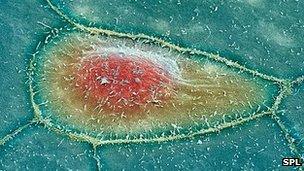NHS cancer diagnosis waiting times down, figures show
- Published

Earlier detection may improve disease outcomes
NHS cancer diagnosis times across the UK have come down significantly in recent years, official figures show.
Bowel cancer is now found, on average, 75 days after a patient first sees their GP with symptoms, compared with 96 days at the start of the millennium.
For oesophageal cancer, the average time to diagnosis after a first GP visit was 59 days in 2001-02. This fell to 48 days in 2007-08.
Experts say the trend is encouraging but must continue.
Breast, stomach and lung cancers showed a slight drop, but not a significant one.
Earlier diagnosis
The figures come from England's General Practice Research Database and cover more than 14,400 patients aged 40 or over who were diagnosed with any of the six different cancers, including pancreatic cancer, and who had previously shown potential cancer symptoms.
The researchers believe the reduction between 2001-02 and 2007-08 may in part be a result of the roll out of guidance in 2005 designed to help doctors decide when a patient should be referred for suspected cancer.
The NICE guidelines for England and Wales include a list of symptoms, like weight loss and fatigue, that might suggest an underlying cancer.
Speaking at the National Cancer Research Institute Cancer Conference in Liverpool, lead researcher Dr Richard Neal, of Bangor University, said: "This gives clear guidance on which symptoms should prompt a doctor to refer a patient for further investigation. But there is considerable variation between cancers, with diagnostic intervals highest in those cancers which are more difficult to diagnose.
"And we do not fully know the effect of the reduction of diagnostic intervals on improvements in stage at diagnosis and long term survival."
Sara Hiom of Cancer Research UK said: "It's very encouraging to see that patients are, on average, being diagnosed more quickly for some cancers, offering a better chance of successful outcome. It's clearly vital for GPs to have access to good quality information to make the best decisions for their patients.
"There is still room for considerable improvement though, and reducing the time to diagnose and treat is a critical part of improving outcomes for people with cancer."
A spokeswoman for the Department of Health said the Government had invested £450m through its cancer strategy to improve early diagnosis, and that modernising the NHS should close the gap in cancer survival between the UK and the best-performing health systems in the world and save 5,000 more lives every year by 2015.
- Published18 July 2011
- Published14 July 2011